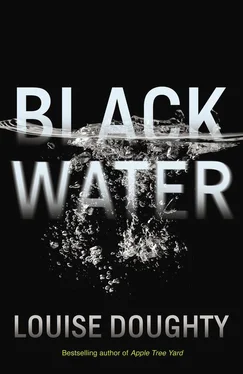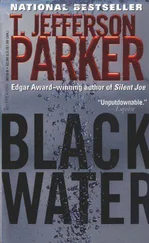Now it is clear who is friend and who is foe. He travelled up country on the back of a motorbike with a driver, Wayan. He had wanted to go on his own but Abang had persuaded him that Wayan was trustworthy and knew the countryside. ‘Once you are up there, you will see,’ Abang said, ‘the paths and lanes, it’s much easier with someone who knows it. Wayan grew up round there. After you’ve seen Komang, you can go off on your own, there’s no hurry then.’
Once outside Denpasar, Harper told Wayan, a thin young man his age, to take it slowly. He didn’t want to risk an accident on the potted road but, in addition, he wanted to get the feel of how things were in the countryside. Mostly, the villages seemed quiet. There were no charred corpses swinging from trees as there had been on Java, not yet. Occasionally, he would see groups of youths sitting on steps — once a group of four older men who looked like a more organised militia, but there was none of the humming tension of Jakarta. Who knew what was happening in the more remote villages, though, up in the hills? It might have started already but they just didn’t know.
They had set off from Denpasar in the morning but were less than halfway when the rain fell. They took shelter in the porch of a shop selling woven baskets in every size from tiny to bath-shaped. The owner of the shop brought them tea in small cups and sat down next to them and they made idle chat while they waited out the rain. Opposite, there was a terraced rice field rising up in swooping green curves, deep green now it was drenched, now the soil and the plants were sucking in the deluge — the earth seemed animate when the rain fell this heavily, as if it was breathing in the water: you could imagine the field’s gentle rise and fall, as if the whole island was a sleeping giant.
The rain was solid for more than two hours. After a while, he leant against a palm tree at the edge of the step and slept, the comforting patter of water around him lulling him, the low voices of Wayan and the shopkeeper nearby.
Eventually, the rain stopped; the sun came out. Wayan smiled at him as he wiped down the motorbike — they had pulled it under the porch of palm leaves but water had dripped through onto the seat. ‘You sleep a long time, boss. You tired.’
Harper grimaced back. He felt not so much tired as calm; a job to be done, the means to do it.
They were around half an hour from their destination, passing through another small village, when Harper leaned forward and tapped Wayan on the shoulder. Wayan braked, killed the engine so that conversation was possible. ‘Let’s get something to eat here,’ Harper said. He didn’t want to spend time looking around for supplies when they got to their destination — such a process would only advertise their presence before they had a chance to speak to Komang and if the farmer was in as much danger as Abang thought then that might not be a good idea. They dismounted from the bike and Harper gave Wayan some rupiah, telling him to be as quick as he could without raising suspicion. He withdrew to a tree trunk at the far end of the street that was close to the undergrowth, somewhat back from the passing trade. This time, he didn’t want to be sitting on a shop step right by the bike, where any villager would be bound to stop for a chat.
He could see the motorbike from where he was sitting and, beyond it, the small row of shops into which Wayan had disappeared. He heard a shout from the other end of the street and turned to see three men, two of them arguing with the third. He glanced back towards the shops and noticed that an elderly couple and two other women had come out onto their steps at the sound of the man’s shout. Then the man who was being confronted stopped and leaned in towards the two others. All at once, the three suddenly had their heads together in conference.
Harper looked round. The four people who had come out to watch the argument had disappeared: the street was now empty but for a scabby grey dog who was moving to and fro across it, nose to the ground.
Of course, he thought. That man has just named someone. Now it is clear who is friend and who is foe . Well, it’s far from clear in fact, but if you want to be a friend, you have to name a foe. Neutrality is not an option. When the militiamen turn up at your door at night, eight or ten of them, in their black clothing with their sickle-shaped machetes, fleeing is not an option — you have what, four or five children? Even if you climb out of the back window and even if the leader of the group hasn’t already stationed a man there to cut you down — a swift chop to the legs, usually below the knee — then you won’t get far before they hunt you down through the rice fields. So, as you cower in the far corner of your home, watching your door shake against the blows, knowing it will hold for a few seconds more, your choice is this: you can wait until the door flies open. You can wait until the men burst into the hut and drag you and your wife and your screaming, terrified children out into the open. Or you can stand, and you can approach the door and call out, ‘Brothers!’
You call out, loud enough to make them pause for a second. ‘Brothers!’ Then, you speak to them urgently. You give them a name.
Tanu. It is your neighbour’s name. He lives in a house just down the hill — a larger house than yours, a bit better than your one-room shack. And now comes the really difficult bit. You have to open the door. You have to smile at the men, greet them. You have to act as though you are pleased they have arrived in your village — if you are afraid of them, they will assume you have something to hide. So, summoning every shred of courage in your bones, you slide back the block. You gesture into the hut with your hand, then turn and bark over your shoulder at your wife to stop crying like an idiot, because these men are friends and might want something to eat and drink, and you smile out into the dark and say, ‘Tanu, my friends. It’s true what I say. I hear his wife is in Gerwani.’ And it is true, now you come to think of it. His wife has always been talking to your wife about the importance of educating the girls, of them being productive workers for the good of the whole village, and she may not have tried to recruit her to the PKI but it’s a bit odd, isn’t it, if she isn’t a Communist, that she’s so keen on the girls going to school?
The men don’t come into the hut. You can’t even see them clearly because the flare from the burning torches is so bright — they are just dark shapes lit by an orange glow. They talk amongst themselves and leave. You bar the door again and return to the corner with your wife and children.
And, after a while, you hear the screaming down the hill. It is the kind of screaming you have never heard before: the kind that pierces your ears. Your neighbour Tanu and his family are being dragged out of their beds. You stay huddled in the corner, your arms around your whimpering children, while the screaming goes on and on, and you know that when you see the charred bodies strung up in the village square in the dawn light you will feel horror and revulsion but what you feel right now, as the screams continue, is relief that they came to your house first, for it is only thanks to that good fortune that you had the chance to name Tanu before he named you.
The three men turned and walked off together, away from the shops. The road curved and they were soon out of sight. It could be that the two aggressors were simply taking the third man somewhere to kill him, or it could be that they were now all plotting together, the best of friends. Harper looked back down the street and saw that an elderly woman had come out of her shop with a broom and was sweeping her step, looking around, but other than her, the street remained empty.
Читать дальше












